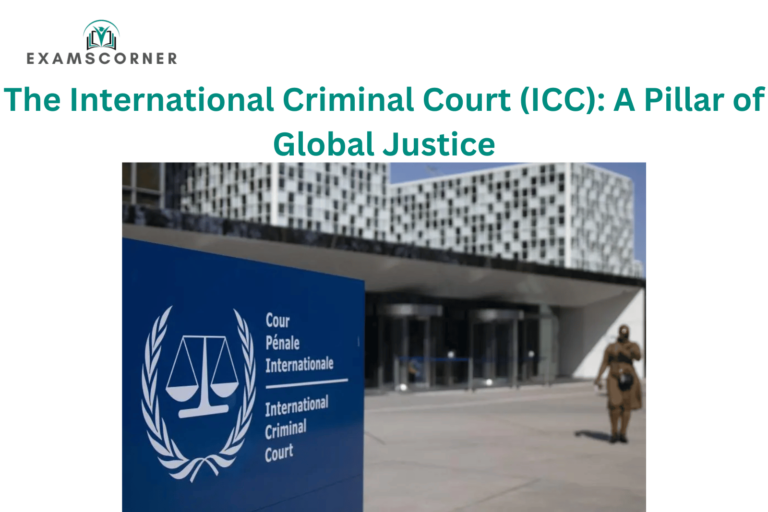Introduction
The International Criminal Court (ICC) is an independent judicial institution that plays a vital role in ensuring accountability for the most serious crimes under international law. Established in 2002, the ICC is headquartered in The Hague, Netherlands, and operates as a court of last resort to prosecute individuals for crimes such as genocide, war crimes, crimes against humanity, and aggression.
Historical Background
The ICC was established through the Rome Statute, adopted on July 17, 1998, by 120 states at a diplomatic conference in Rome. The court officially began functioning on July 1, 2002, when the Rome Statute entered into force after being ratified by 60 countries.
The ICC’s creation marked a significant step in the development of international law, building upon earlier tribunals such as the Nuremberg and Tokyo Trials following World War II and the ad hoc tribunals for Yugoslavia and Rwanda in the 1990s.
Key Objectives of the ICC
The ICC’s mission is to ensure justice for victims of heinous crimes and to promote global peace and security. Its core objectives include:
- Ending Impunity: Holding individuals accountable for crimes that violate international law.
- Deterrence: Preventing future atrocities by establishing the principle of accountability.
- Providing Justice for Victims: Giving victims a platform to voice their experiences and seek reparations.
- Strengthening International Law: Contributing to the development and enforcement of international legal standards.
Jurisdiction of the ICC
The ICC’s jurisdiction is limited to the following crimes:
- Genocide: Acts committed with the intent to destroy, in whole or in part, a national, ethnic, racial, or religious group.
- War Crimes: Violations of the laws and customs of war, including targeting civilians, using child soldiers, and mistreating prisoners of war.
- Crimes Against Humanity: Widespread or systematic attacks against civilians, such as murder, enslavement, and torture.
- Aggression: Acts of armed force by one state against the sovereignty, territorial integrity, or political independence of another state.
The ICC’s jurisdiction is complementary, meaning it can only prosecute cases if national courts are unwilling or unable to do so. Additionally, it can only address crimes committed after July 1, 2002, and within the territories of states that are parties to the Rome Statute or by their nationals.
Structure of the ICC
The ICC consists of four main organs:
- The Presidency: Responsible for the overall administration of the court.
- The Judicial Divisions: Comprising pre-trial, trial, and appeals chambers to handle different stages of cases.
- The Office of the Prosecutor (OTP): Investigates and prosecutes cases brought before the court.
- The Registry: Provides administrative and operational support to the court.
Notable Cases and Challenges
Prominent Cases
The ICC has handled several high-profile cases, including:
- Thomas Lubanga (DR Congo): The court’s first conviction in 2012 for recruiting child soldiers.
- Omar al-Bashir (Sudan): Issued arrest warrants for the former Sudanese President for genocide and war crimes in Darfur.
- Jean-Pierre Bemba (DR Congo): Convicted of war crimes and crimes against humanity for acts of sexual violence.
Criticisms and Challenges
The ICC has faced criticism and challenges, including:
- Limited Jurisdiction: Major powers like the United States, China, and Russia are not parties to the Rome Statute, limiting the court’s reach.
- Perception of Bias: Accusations of focusing disproportionately on African nations.
- Enforcement Issues: The ICC lacks its own enforcement mechanism, relying on member states to arrest and surrender suspects.
- Political Interference: Allegations of political motivations influencing investigations and prosecutions.
The ICC’s Impact on Global Justice
Despite its limitations, the ICC has significantly contributed to advancing global justice. It has:
- Raised awareness about international crimes.
- Strengthened the legal framework for prosecuting atrocities.
- Empowered victims and communities affected by war crimes and genocide.
Conclusion
The International Criminal Court remains a cornerstone of international justice, striving to hold individuals accountable for the world’s most serious crimes. While it faces challenges, its existence symbolizes the international community’s commitment to the rule of law and the principle that no one is above accountability. As the ICC evolves, its role in promoting justice and deterring future atrocities will continue to be crucial in shaping a more just and peaceful world.



